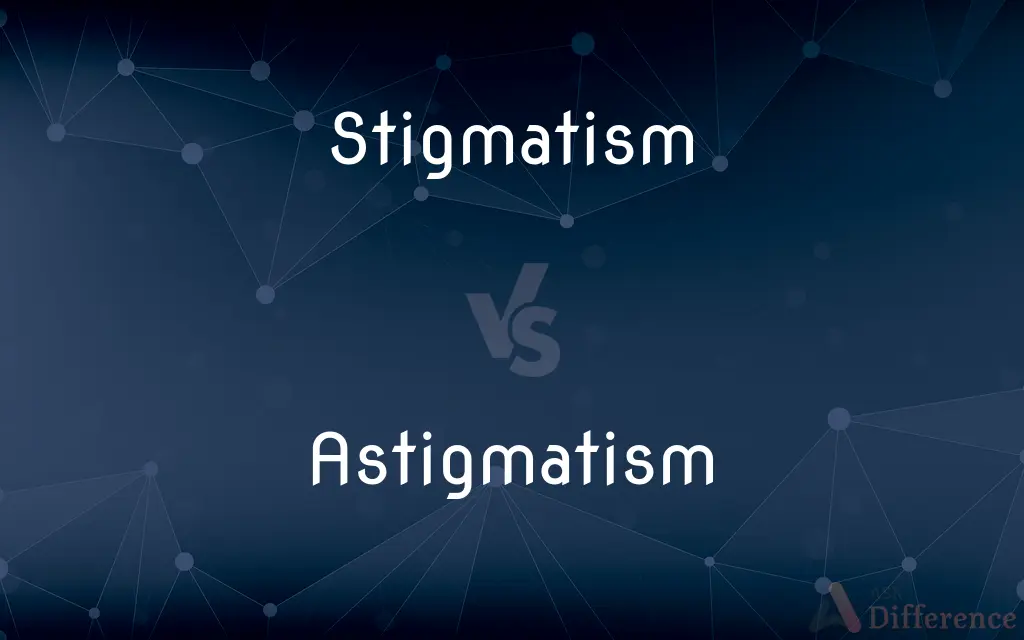Stigmatism vs. Astigmatism — What's the Difference?
By Tayyaba Rehman — Updated on September 4, 2023
"Stigmatism" generally refers to a point focus, while "Astigmatism" is an eye condition where the cornea has an irregular shape, causing blurred vision.

Difference Between Stigmatism and Astigmatism
Table of Contents
ADVERTISEMENT
Key Differences
"Stigmatism" and "Astigmatism" are terms that, while sounding similar, have distinct meanings. "Stigmatism" often references the property of having a single focal point or being stigmatic in optics.
On the other hand, "Astigmatism" is a common vision condition. Unlike "Stigmatism," which concerns point focuses, "Astigmatism" deals with the eyes' inability to focus light evenly onto the retina due to an irregularly shaped cornea or lens.
The term "Stigmatism" is less commonly heard in everyday language, mainly reserved for specific scientific or optical contexts. In contrast, "Astigmatism" is a term many are familiar with, especially those who have been to an optometrist or ophthalmologist.
While "Stigmatism" is more neutral, denoting a type of focus, "Astigmatism" implies an imperfection in the eye. It's a condition many people have corrected with glasses, contact lenses, or surgery.
It's crucial to use these terms correctly. If you're discussing optics or point focuses, "Stigmatism" is your word. However, for eye conditions resulting in blurred vision, you'd refer to "Astigmatism."
ADVERTISEMENT
Comparison Chart
Definition
Refers to point focus in optics.
An eye condition due to irregularly shaped cornea or lens.
Common Usage
In optics or scientific contexts.
In ophthalmology, optometry, and general discussions about vision.
Associated with
Science and optics.
Eye and vision conditions.
Indicates
A focus property.
An imperfection or condition in the eye.
Corrective Measures
Not applicable.
Glasses, contact lenses, or surgery.
Compare with Definitions
Stigmatism
A property in optics where light converges to a single point.
In our experiment, we observed perfect stigmatism in the lens system.
Astigmatism
A refractive error causing blurred vision due to an irregularly shaped cornea.
She was diagnosed with astigmatism and was prescribed corrective lenses.
Stigmatism
In geometric optics, stigmatism refers to the image-formation property of an optical system which focuses a single point source in object space into a single point in image space. Two such points are called a stigmatic pair of the optical system.
Astigmatism
A defect in an optical system caused by deviation from spherical curvature.
The telescope was adjusted to correct the slight astigmatism.
Stigmatism
The condition of being affected by stigmata.
Astigmatism
A condition in which there's a difference in the degree of refraction in different meridians.
His astigmatism was more pronounced in the horizontal meridian.
Stigmatism
The state of a refracting or reflecting system in which light rays from a single point are accurately focused at another point.
Astigmatism
An inability of the cornea to properly focus an image onto the retina.
Astigmatism often results in a slightly stretched or distorted vision.
Stigmatism
Normal eyesight.
Astigmatism
A common vision condition correctable with prescription eyewear.
Many people aren't aware they have astigmatism until they have their first eye exam.
Stigmatism
(optics) Image-formation property of an optical system which focuses a single point source in object space into a single point in image space
Astigmatism
Astigmatism is a type of refractive error in which the eye does not focus light evenly on the retina, due to a variation in the optical power of the eye for light coming from different directions. This results in distorted or blurred vision at any distance.
Stigmatism
(medicine) Normal eyesight, anastigmatic state
Astigmatism
A visual defect in which the unequal curvature of one or more refractive surfaces of the eye, usually the cornea, prevents light rays from focusing clearly at one point on the retina, resulting in blurred vision.
Stigmatism
(pathology) State of having stigmata
Astigmatism
(optics) A defect of a lens such that light rays coming from a point do not meet at a focal point so that the image is blurred.
Stigmatism
The condition of having or being marked by stigmata
Astigmatism
(pathology) A disorder of the vision, usually due to a misshapen cornea, such that light does not focus correctly on the retina causing a blurred image.
Stigmatism
(optics) condition of an optical system (as a lens) in which light rays from a single point converge in a single focal point
Astigmatism
A defect of the eye or of a lens, in consequence of which the rays derived from one point are not brought to a single focal point, thus causing imperfect images or indistinctness of vision.
Stigmatism
Normal eyesight
Astigmatism
(ophthalmology) impaired eyesight resulting usually from irregular conformation of the cornea
Astigmatism
(optics) defect in an optical system in which light rays from a single point fail to converge in a single focal point
Common Curiosities
Is Stigmatism related to optics?
Yes, Stigmatism primarily concerns optics and the property of point focuses.
Can you correct Astigmatism?
Yes, Astigmatism is commonly corrected with glasses, contact lenses, or even surgery.
How does Astigmatism affect vision?
Astigmatism causes blurred or distorted vision due to an irregular cornea or lens shape.
What is Stigmatism?
Stigmatism refers to the property of having a single focal point, especially in optics.
Is Stigmatism an eye condition?
No, Stigmatism refers to a property in optics, not an eye condition.
Do lenses with Stigmatism focus light to a single point?
Yes, in optics, lenses exhibiting Stigmatism focus light to a single point.
Is Astigmatism hereditary?
Astigmatism can be hereditary, with chances of children inheriting it if their parents have the condition.
Does Stigmatism affect vision?
Stigmatism in itself isn't about vision but rather a property in optics related to focus.
Is Astigmatism present at birth?
Astigmatism can be present at birth or develop later in life.
Is Stigmatism a common term in everyday language?
No, Stigmatism is less commonly used, mainly in specific scientific contexts.
Do all people with Astigmatism need corrective lenses?
Not all, but many people with astigmatism may benefit from corrective lenses for clearer vision.
What causes Astigmatism?
Astigmatism is caused by an irregular curvature of the cornea or lens in the eye.
How common is Astigmatism?
Astigmatism is a common vision condition affecting many people worldwide.
How is Stigmatism observed?
Stigmatism can be observed in optical systems where light converges to a single point.
Can Stigmatism and Astigmatism be used interchangeably?
No, they refer to different things; Stigmatism is about optics, and Astigmatism is an eye condition.
Share Your Discovery

Previous Comparison
Rest vs. Motion
Next Comparison
Adinity vs. AdicityAuthor Spotlight
Written by
Tayyaba RehmanTayyaba Rehman is a distinguished writer, currently serving as a primary contributor to askdifference.com. As a researcher in semantics and etymology, Tayyaba's passion for the complexity of languages and their distinctions has found a perfect home on the platform. Tayyaba delves into the intricacies of language, distinguishing between commonly confused words and phrases, thereby providing clarity for readers worldwide.















































